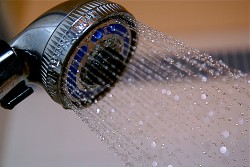- Eliminate excess prepositional phrases
Prepositional phrases often add nothing to a story. Many just complicate sentences. For example, in the previous sentence I could have written, "Many of them just complicate sentences." What does "of them" add to the sentence? The sentence is understandable without that useless phrase, so I saved two words.
Here is a partial list of prepositions:
about, after, along, around, at, before, below, between,
during, for, from, in, inside, into, of, over, through, to, under
Search your story for these words; you may find you can eliminate the phrases they introduce with no change in meaning.
- Watch out for excessive adjectives and adverbs
Journalists learn to strike almost all adjectives and adverbs from their writing because using them may imply a meaning that may not have been there in the incident or event they're reporting. For example, a well-trained journalist wouldn't write, "The mayor stridently said he wouldn't support a tax increase." Good journalists know they shouldn't imply a meaning to the mayor's words that may or may not be there.
Instead, the journalist would say, "The mayor said he wouldn't support a tax increase." Although your story or book may not be journalistic in nature, you can learn from these trained writers to trim unnecessary, and perhaps misleading, words.
- Use active voice, not passive voice
In active voice, the subject is doing the acting. In passive voice, the subject is being acted on. Here are a couple of examples:
Passive: The tax increase was approved by the commissioners.
Active: Commissioners approved the tax increase.
Passive: Our burgers are enjoyed by kids of all ages.
Active: Kids of all ages enjoy our burgers.
Notice how active voice shortens sentences. In the first example, I saved three words; in the second, two words. That's conciseness.
Furthermore, active voice gives sentences "punch." It makes writing sound more direct and is easier to understand. Excessive use of passive voice makes weak writing.
- Cut words that add nothing
You may have heard the advice to "write as you speak." Generally, that's good advice. Good writing is unpretentious, just like our speech. We don't say, "The weather looks like rain today." We say, "It looks like rain today." Similarly, most writing should be natural and informal.
The snag with this advice, good as it usually is, is that our conversation is laced with filler words that don't add anything to our meaning. Probably we do this because our minds think faster than we can talk; we unconsciously add those extra words to let our mouths catch up to our brains.
Here are a few examples of meaningless words and phrases I've collected from my university students.
Mickey Mantle was such a great baseball player
This product doesn’t cause any burning sensations
He's a good man, on and off of the court
You can find information online at anytime
Now the edited versions:
Mickey Mantle was a great baseball player (one fewer word)
This product doesn’t burn (four fewer words)
He's a good man, on and off the court (one fewer word)
You can find information online anytime (one fewer word)
Notice I didn't change the meaning of any sentence; I just cut worthless words.
- Replace weak verbs with strong ones
You’ll remember the concept of “helping” or “linking” verbs from high school English. These verbs carry no real meaning. Replace them with more forceful verbs.
Here is a partial list of helping verbs to avoid:
am, are, be, been, can, could, had, has,
have, is, shall, should, was, were, will, would
The negative side of these verbs—cannot, shouldn’t, won't, etc.—are also weak. Likewise for contractions, such as I’m, you’re, can't, etc.
You can’t always avoid using these weak verbs. (I used one in the preceding sentence.) But when possible substitute a stronger verb.
Doing so will not only make your writing more concise by cutting words, it will add additional punch to your writing, making it stronger. Here’s an example: “Smith was an excellent student in high school." Avoid the weak verb was by writing: “Smith excelled academically in high school." We're saving two words and writing a stronger sentence, too.





 How to stay safe in the woodson 04/07/2013
How to stay safe in the woodson 04/07/2013




Comments
This is an excellent English refresher course. Many writers, myself included, can improve our writing.
Excellent advice delivered in a very concise article. I'm pinning this to My Online Writing board.